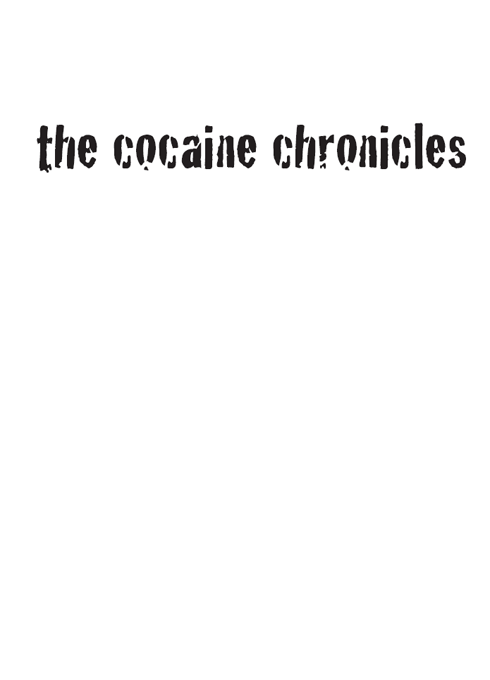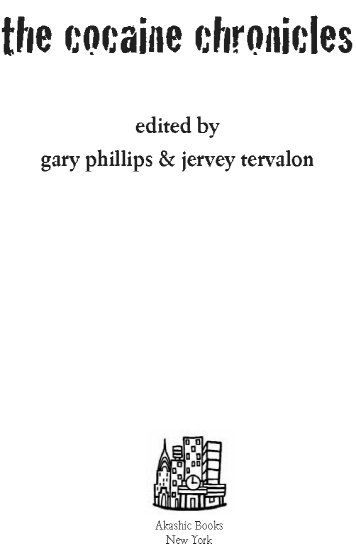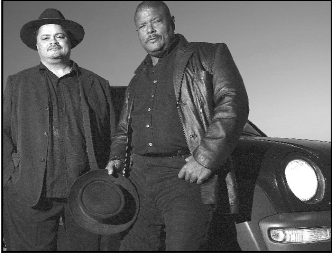The Cocaine Chronicles




This collection is a work of fiction. All names, characters, places, and incidents are the product of the authors’ imaginations. Any resemblance to real events or persons, living or dead, is entirely coincidental.
Published by Akashic Books
©2005 Gary Phillips & Jervey Tervalon
ePUB ISBN-13: 978-1-936-07050-3
ISBN-13: 978-1-888451-75-7
ISBN-10: 1-888451-75-0
Library of Congress Control Number: 2004115619
All rights reserved
Akashic Books
PO Box 1456
New York, NY 10009
[email protected]
www.akashicbooks.com
For all our brothers and sisters who now only get high on life
table of contents
gary phillips & jervey tervalon
the crack cocaine diet
laura lippman
beneficent diversions from the crackdkins diet
donnell alexander
twilight of the stooges
jerry stahl
viki, flash, and the pied-piper of shoebies
deborah vankin
just surviving another day
detrice jones
a.k.a., moises rockafella
emory holmes 11
Cocaine made me feel like a new man. And he wanted some too.
—Richard Pryor
I went right home and I went to bed
I stuck that lovin’ .44 beneath my head
Got up next mornin’ and I grabbed that gun
Took a shot of cocaine and away I run.
—Johnny Cash
But consider!…Count the cost! Your brain may, as you say, be roused and
excited, but it is a pathological and morbid process which involves increased
tissue-change and may at least leave a permanent weakness. You know, too,
what a black reaction comes upon you. Surely the game is hardly worth the
candle. Why should you, for a mere passing pleasure, risk the loss of those
great powers with which you have been endowed? Remember that I speak
not only as one comrade to another but as a medical man to one for whose
constitution he is to some extent answerable.
—Dr. John Watson to his friend Sherlock Holmes in
Sign of the Four
by Arthur Conan Doyle

Ibarionex R. Perello
JERVEY TERVALON & GARY PHILLIPS
by gary phillips & jervey tervalon
So, Jervey, how about it? Did you ever partake?
No, G, I’ve never smoked cocaine, never hit the pipe, didn’t tempt me in the least, because I had been inoculated against it with a healthy dose of junior high school ass-kicking. I assumed the pusherman would just as soon poison me as get me high. It never occurred to me that it would be a way to live, but it’s always fascinated me, how folks fall into it, plunge headlong into the depths of human tragedy through the pursuit of the pipe. I’ve written about murderous crack addicts, about dope fiends, the true zombies of the streets
because
.
If you lived through the ’80s anywhere near an urban core, you’d have to be stone-cold stupid not to notice them. And you’d have to be dull-witted not to know that these drug zombies were fictionally interesting and shouldn’t be consigned to the lower rungs of pulp fiction or ghetto literature. Certainly cocaine has had a long-lasting appeal in popular culture, from Cab Calloway’s “Minnie the Moocher” to Public Enemy’s “Night of the Living Baseheads.
”
But it’s not just about popular appeal, it’s also about an inclusive literary landscape.
What about you, G?
For me, blow serves as two clear demarcations in my life. The first was the summer of ’73, when I was home from my first year of college at San Francisco State. That summer there were sarto- rial ripples in the ghetto culture caused by the film
Superfly.
That flick laid down some serious iconographic shit in the brains of my friends from high school like crack would grip fools in the years to come. Cats were stylin’ in long quilted coats, wide-brim hats, and flared slacks. Everybody was sporting ornamental coke spoons around their necks when they hit the club, trying to keep their balance in those silly-ass platform shoes while rapping to a fox in fake leather thigh-high boots and a velvet mini.
I didn’t sport a coat like the anti-hero drug dealer Priest in
Superfly,
with a style and attitude that would influence other movies and TV shows like
Starsky and Hutch
and
Baretta
—Antonio Fargas as Huggie Bear in the former, and Michael D. Roberts as Rooster in the latter. But I do remember going to a hat store on Manchester and purchasing a gray gangster brim and wearing that bad boy to parties, driving my dad’s yellow ’65 Galaxie 500 with the black Landau top and blasting Curtis Mayfield’s too-cold
Superfly
sounds and Isaac Hayes’s “Theme from Shaft” on the 8-track. There was a lot of weed at those parties but I don’t recall much blow—though there was a lot of talk about somebody knew a dude who knows a dude and we can get some—but sure as hell, if there was some getting, nobody offered me any that summer. This was before crack became synonymous with the inner city, and powder the suburbs.
Drugs are class-driven like everything else, and stories about crack cocaine aren’t for the mainstream readers of fiction; not the polite subject for drug literature or its crasser little brother,
heroin
fiction.
Lithium is cool, antidepressants are too, but don’t mention crack or freebase…those low-class drugs for self-medication.
Which brings me to the second incursion of coke into my life, Jervey. This was a few years later when I met this older woman—I mean, she was in her thirties and I was in my twenties—and we started going around together. She introduced me to the wonders of the toot. Now, given my wife might be reading this, or my teenage kids, I shall eschew graphic reportage of intimate encounters enhanced by the ’caine. But as Hendrix would say, I did, indeed, kiss the sky.

As to how this book came about, we’d been invited to the
Los
Angeles Times
Festival of Books to participate on a panel commemorating the tenth anniversary of the Los Angeles riots of 1992.
Jervey had edited
Geography of Rage,
a collection of essays about the civil unrest published in 2002, and Gary had a piece in it.
Later we talked about how weird it was that with all the anthologies, from the erotic to the criminal, we hadn’t come across any inspired by cocaine, the scourge of our times. We both thought it would be a good idea, but good ideas get lost with bad ones.
So we met a few weeks after the panel, kicked the idea around some more, and came up with an outline, but didn’t get too far beyond that. We went our separate ways assuming it wouldn’t get done.
Then along came Akashic Books publisher Johnny Temple, who, fresh from the success of
Brooklyn Noir,
an ambitious collection of crime-fiction stories, asked us about the cocaine idea months after we’d mentioned it to him in passing. Soon the concept was cranking, and not long after we began inviting submissions, excellent stories started blowing in.
The stories we ultimately selected for this collection reflect what interests us as observers of the human condition in its various physical and psychological permutations. The four sections of the book are used as a rough breakdown of the effects cocaine has on the participants in a given story, no matter what side of the tracks it occurs on—though some relate tales of those who actually
cross
those tracks in their hunt for the flake, the rock…or in their attempt to escape its grip.
Here are some samples:
Detrice Jones’s powerful vignette of a young girl living with addicted parents who spend their days trying to gank their daughter’s lunch money; National Book Award–nominee Susan Straight’s hard-ass story of an aging crackwhore; Jerry Stahl’s absurd, ribald portrayal of a debased coke fiend; and Bill Moody’s low notes about the nature of caring and waste. There’s also Bob Ward’s tale of love gone strange, Nina Revoyr’s harrowing piece revealing how things do not always go better with coke, and Laura Lippman’s hilariously twisted slice of the underbelly.
These are some of the scary charms found in
The Cocaine
Chronicles.
We hope you find value in them.
Every contributor to this anthology stepped up and delivered. We are very grateful to each of them for coming through on relatively short notice and relatively minimal pay. They were truly inspired by the subject matter.
For as the late, great superfreak Rick James once said,
“Cocaine, it’s a hell of a drug!”